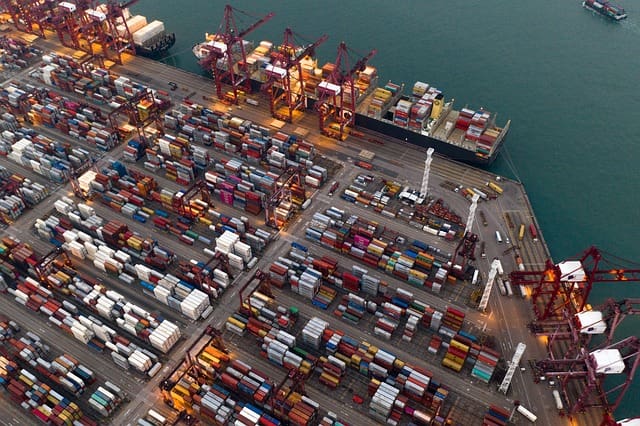Business
What Advantages Do Countries Gain From Forming International Trade Agreements?


International trade agreements have become a cornerstone of global economic integration, leading countries to reap numerous benefits from their participation. These agreements provide a platform for countries to expand their economic growth, gain access to new markets, and create employment opportunities.
However, the advantages extend beyond just economic factors, as trade agreements also facilitate the transfer of technology and attract foreign investments. The impact of these advantages is far-reaching, shaping the competitive landscape of nations and fostering collaborations that drive prosperity.
Key Takeaways
- Increased international trade agreements facilitate economic growth and market access by reducing trade barriers and expanding production, leading to increased economic activity and revenue growth.
- International trade agreements create job opportunities by opening up new markets, enhancing efficiency and competitiveness, and diversifying industries, ultimately reducing unemployment rates and elevating living standards.
- These agreements attract foreign direct investment (FDI) by offering improved market access and investment opportunities, encouraging technology transfer, stimulating investments in infrastructure development, and promoting economic diversification.
- International trade agreements facilitate technology transfer by promoting cross-border collaboration and knowledge exchange, transferring advanced technologies and expertise, enhancing productivity, innovation, and sustainable development, and promoting global growth and equitable distribution of knowledge and resources.
Economic Growth
International trade agreements have been shown to significantly contribute to economic growth by fostering increased international exchange of goods and services. By reducing trade barriers such as tariffs and quotas, these agreements create opportunities for businesses to access new markets, leading to expanded production and sales. This, in turn, boosts economic activity and generates employment opportunities, ultimately driving overall economic growth.
Additionally, international trade agreements promote efficiency and specialization, as countries can focus on producing goods and services in which they have a comparative advantage. This leads to enhanced productivity and innovation within domestic industries.
Furthermore, these agreements encourage foreign direct investment (FDI) by providing a more secure and predictable environment for investors. FDI not only brings in capital but also facilitates the transfer of technology, knowledge, and management skills, which can further stimulate economic growth.
Moreover, international trade agreements often incorporate provisions for intellectual property rights protection, which can incentivize innovation and creativity, fostering economic advancement.
In summation, the evidence overwhelmingly supports the notion that international trade agreements play a pivotal role in driving economic growth by facilitating trade, encouraging investment, and promoting innovation and efficiency.
Market Access
Improved market access is a crucial aspect of international trade agreements, enabling businesses to reach new customers and expand their sales opportunities. Through such agreements, countries can benefit from:
- Reduced Trade Barriers: International trade agreements often lead to the reduction or elimination of tariffs, quotas, and other trade barriers, making it easier for businesses to access foreign markets.
- Access to Raw Materials and Inputs: Trade agreements can provide access to essential raw materials and inputs that may not be available domestically, enabling businesses to improve their production processes and competitiveness.
- Increased Export Opportunities: By gaining access to new markets, businesses can increase their export opportunities, leading to potential revenue growth and economies of scale.
- Enhanced Market Stability: International trade agreements can contribute to market stability by promoting transparent and predictable trade rules, reducing the risk for businesses entering new markets.
- Stimulated Foreign Direct Investment (FDI): Improved market access can attract foreign investment, as companies seek to establish a presence in markets with favorable trade conditions, leading to technology transfer and job creation.
Job Creation
One significant outcome of international trade agreements is the potential for job creation, which plays a pivotal role in fostering economic growth and prosperity. When countries engage in international trade agreements, they open up new markets for their goods and services, leading to increased demand and production.
This increased production subsequently requires more labor, thereby creating job opportunities. Additionally, international trade agreements often involve the removal of trade barriers, such as tariffs and quotas, which can lead to greater efficiency and competitiveness for domestic industries. As a result, businesses may expand to meet the heightened demand, necessitating more workers.


Furthermore, the diversification of industries due to access to a wider market can also generate employment across various sectors of the economy. Empirical evidence suggests that international trade agreements have contributed to job creation in many countries, thus reducing unemployment rates and elevating living standards.
Investment Opportunities
An examination of investment opportunities stemming from international trade agreements reveals the potential for significant financial growth and market expansion. International trade agreements open up avenues for foreign direct investment (FDI) and provide a stable and predictable environment for investors.
Here are five key investment opportunities resulting from international trade agreements:
- FDI Inflows: Trade agreements facilitate FDI by providing a secure legal framework, reducing investment barriers, and ensuring protection against expropriation.
- Market Access: These agreements offer improved market access by reducing tariffs and non-tariff barriers, thereby attracting foreign investors seeking new market opportunities.
- Technology Transfer: Trade agreements often encourage technology transfer by fostering collaboration and knowledge exchange between countries, which can attract investments in research and development.
- Infrastructure Development: Investments in infrastructure projects, such as transportation and telecommunications, are often stimulated by trade agreements to facilitate the movement of goods and services.
- Economic Diversification: Countries can attract investments in various sectors, leading to economic diversification and reducing dependence on a single industry or market.
These investment opportunities not only benefit the investing countries but also contribute to the overall economic growth and development of the nations involved.
Technology Transfer
Technology transfer resulting from international trade agreements plays a pivotal role in fostering cross-border collaboration and knowledge exchange, thereby contributing to the advancement of research and development initiatives.


When countries engage in international trade agreements, they often facilitate the transfer of advanced technologies, know-how, and expertise between nations. This transfer can occur through various means, such as joint ventures, foreign direct investment, or collaborative research and development projects. As a result, developing countries can gain access to cutting-edge technologies that can significantly enhance their industrial and agricultural productivity.
Moreover, through technology transfer, countries can improve their capacity for innovation and adapt existing technologies to address local challenges, thereby promoting sustainable development.
Furthermore, technology transfer can lead to the diffusion of knowledge and best practices across borders, ultimately contributing to the overall growth and competitiveness of the global economy. By sharing technological advancements, countries can collectively address common global challenges, such as climate change, healthcare, and food security. Additionally, the exchange of technologies can foster a more equitable distribution of knowledge and resources, ultimately promoting freedom and prosperity on an international scale.
Frequently Asked Questions
How Do International Trade Agreements Affect the Environmental Sustainability of Participating Countries?
International trade agreements can influence environmental sustainability by setting standards for environmental protection, promoting sustainable practices, and enabling the transfer of green technologies. They can also create incentives for countries to adopt environmentally friendly policies.
Are There Any Potential Negative Impacts on Local Industries and Small Businesses as a Result of International Trade Agreements?
International trade agreements can lead to negative impacts on local industries and small businesses, including increased competition from larger, more established foreign companies, potential job losses, and pressure to conform to international standards that may be costly to implement.
What Role Do Intellectual Property Rights Play in International Trade Agreements and How Do They Affect Innovation and Creativity in Participating Countries?
Intellectual property rights are a critical component of international trade agreements, providing legal protection for innovations and creative works. They foster innovation by incentivizing creators and ensuring fair compensation, ultimately driving economic growth within participating countries.
How Do International Trade Agreements Address Issues of Labor Rights and Fair Wages for Workers in Different Countries?
International trade agreements address labor rights and fair wages by establishing standards, promoting compliance, and fostering dialogue. They aim to ensure workers are treated ethically and compensated fairly, contributing to global economic development and social justice.
What Measures Are in Place to Ensure That International Trade Agreements Do Not Exacerbate Income Inequality Within Participating Countries?
Measures to prevent exacerbation of income inequality within participating countries include provisions for fair labor standards, environmental protections, and dispute resolution mechanisms. Rigorous monitoring and enforcement of these measures are vital for ensuring equitable outcomes.


Hi, I’m Kyle Rivera, a news journalist and blog editor with the Daily Evening News. A TCU alum with a flair for storytelling, I spend my days uncovering impactful stories and my evenings exploring the realms of yoga, cycling, and whimsically bad poetry.
Travel is my escape; I’ve trekked from Tokyo’s neon lights to Iceland’s tranquil vistas. But no journey is complete without Mogli, my Golden Retriever, who’s redefining his breed standards in the most charming ways.
I love connecting with fellow travelers, yogis, cyclists, and anyone who enjoys a laugh at my poetic attempts. If you’re into stories that inspire, travel escapades, or just want to see what Mogli and I are up to, I’d love to hear from you on Instagram or Facebook. Let’s share tales and tips from around the globe!

